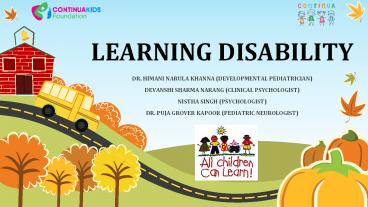Learning disability - PowerPoint PPT Presentation
Title:
Learning disability
Description:
Continua Kids (Centre of Neurotherapy In Uniquely-Abled Kids) helps children those are learning disable. We are different type of therapy like Psychotherapy, Speech therapy etc. – PowerPoint PPT presentation
Number of Views:937
Title: Learning disability
1
?LEARNING DISABILITY
- ?DR. HIMANI NARULA KHANNA (DEVELOPMENTAL
PEDIATRICIAN)DEVANSHI SHARMA NARANG (CLINICAL
PSYCHOLOGIST)NISTHA SINGH (PSYCHOLOGIST)DR.
PUJA GROVER KAPOOR (PEDIATRIC NEUROLOGIST)
2
?OVERVIEW OF THE WORKSHOP
- ?What is learning disability
- Types of learning disabilities
- Causes
- How to detect learning disability
- How do we know when its not learning disability
- Those who can diagnose learning disability
- Interventions
- Some tests to diagnose learning disability
- Some provisions for children with learning
disabilities - CBSE guidelines
- Laws
3
?WHAT IS LEARNING DISABILITY?
4
- ?A neurological disorder
- Affect the brain's ability to receive, process,
analyze, or store information - Comparatively difficult to learn
- Excluded form the group are, kids with visual,
hearing or motor handicaps, mental retardation,
emotional disturbance, or economical
disadvantages
5
?WHAT ARE THE TYPES OF LEARNING DISABILITIES?
6
- ?Dyslexia
- Difficulty processing and understanding what is
read or heard (words, sentences, or paragraphs) - Dyscalculia
- Difficulty in learning or comprehending math
concepts - Dysgraphia
- Difficulty forming letters and write within a
defined space - Auditory and Visual Processing Disorders
- Difficulty distinguishing similar sounds and
seeing the differences between similar letters,
number, shapes and patterns etc. - Nonverbal Learning Disabilities (dyspraxia)
- Significant discrepancy between higher verbal
skills but weaker visual-spatial and social
skills
7
?WHAT CAUSES LEARNING DISABILITY?
8
?HEREDITY AND GENETICS
- ?Learning disabilities often run in the family.
- Children with learning disabilities are likely to
have parents or other relatives with similar
difficulties.
9
?PROBLEMS DURING PREGNANCY AND BIRTH
- ?Learning disabilities can result from anomalies
in the developing brain illness or injury, fetal
exposure to alcohol or drugs, low birth weight,
oxygen deprivation, or by premature or prolonged
labor.
10
?ACCIDENTS AFTER BIRTH
- ?Learning disabilities can also be caused by head
injuries, malnutrition, or by toxic exposure
(such as heavy metals or pesticides)
11
?HOW COMMON IS LEARNING DISABILITY? (Incidence
and prevalence)
- Information about LD occurring in Indian children
is scanty. The incidence of dyslexia in primary
school children in India has been reported to be
2-18, of dysgraphia 14, and of dyscalculia 5.5
(17-19) in 2011.
12
?HOW DO WE KNOW IF A CHILD HAS LEARNING
DISABILITY?
13
?SOME CHARACTERISTICS
- ?Slow reading rate
- Difficulty remembering math facts
- Problems with reasoning and abstract concepts
- Difficulty finding important points or main ideas
- Problem understanding and remembering what is
read - Confusion of similar words
- Confusion or reversal of symbols, letters,
numbers - Frequent spelling errors
14
?WHEN DO WE KNOW ITS NOT LEARNING DISABILITY?
15
?WHAT LEARNING DISABILITIES ARE NOT!
- ?Some children begin as slow learners but are
eventually able to learn and cope with their
studies and other activities - Some children may not be interested in certain
subjects or activities - Some children may be interested in sports or
outdoor activities. These attributes indicate
the child's interests and are not learning
disability
16
?WHO CAN DIAGNOSE LEARNING DISABILITY?
17
?TYPES OF SPECIALISTS WHO MAY BE ABLE TO TEST FOR
AND DIAGNOSE LEARNING DISABILITIES
- ?Clinical psychologists
- School psychologists
- Child psychiatrists
- Educational psychologists
- Developmental psychologists
- ?Neuropsychologist
- Occupational therapist (tests sensory disorders
that can lead to learning problems) - Speech and language therapist
18
?HOW DOES A PSYCHOLOGIST ASSESS LEARNING
DISABILITIES?
19
?NIMHANS BATTERY
20
- ?The National Institute of Mental Health and
Neurosciences (NIMHANS), Bangalore has developed
the index to assess children with LD(Hirisave U,
et al., 2002). - There are two levels of this index. They are
- Level I for children 5-7 years and
- Level II for 8-12years. The index comprises of
the following tests - a. Attention test (Number cancellation).b.
Visuo-motor skills (the Bender Gestalt test and
the Developmental test of Visuo Motor
integration).c. Auditory and Visual
Processing(discrimination and memory).d.
Reading, writing, spelling and comprehension.e.
Speech and Language including Auditory behaviour
(Receptive Language) and Verbal expression.f.
Arithmetic (Addition, subtraction,multiplication,
division and fraction) (Hirisave U, et al., 2002
).
21
(No Transcript)
22
(No Transcript)
23
(No Transcript)
24
?WHAT ARE SOME OF THE TREATMENTS AND
INTERVENTIONS FOR LEARNING DISABILITY?
25
- ?Psychotherapy (for comorbid conditions anger,
frustration, mood)
26
- Special Education (Individualized Education
Program)
27
- Speech therapy
28
- Occupational therapy
29
THANK YOU































